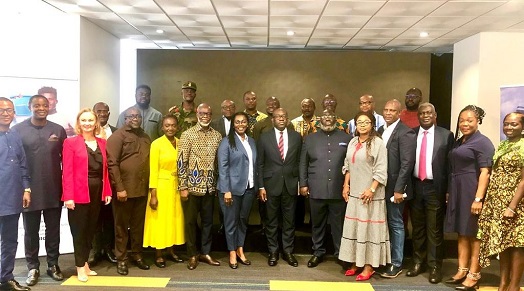The National Communications Authority (NCA) has launched the trial phase of the Digital Audio Broadcasting (DAB+) to provide a more advanced and efficient radio broadcasting service.
This service uses digital signals to deliver enhanced sound quality, expanded station choices, and interactive features and offers several advantages over traditional analogue FM radio.
The DAB+ can accommodate a larger number of stations without the congestion associated with traditional analogue broadcasting, thereby expanding the variety of content available and opening up opportunities for emerging voices and local talents to reach wider audiences.
The DAB+ when rolled out will help overcome frequency constraints, improve reception quality, ensure effective spectrum usage and enhanced interactive services as well as guarantee ease of selecting DAB stations to listen.
The Minister for Communication and Digitalization, Mrs Ursula Owusu-Ekuful, who launched the trial phase of the DAB+ in Accra on Tuesday, disclosed that the service positions Ghana as the first country in West Africa and the fourth in Africa to deploy DAB+.
She highlighted the transformative potential of DAB+ in addressing long-standing challenges while setting the stage for a new era of communication and connectivity.
“Today, as we embark on this journey of digital audio broadcasting, we are taking a giant stride towards a more connected and inclusive future.” “DAB+ is not just about radio; it’s about expanding the horizons of our citizens, amplifying diverse voices, and fostering an environment where innovation can flourish,” Mrs Owusu Ekuful noted.
Mrs Owusu-Ekuful underscored the critical role of DAB+ in overcoming the limitations of traditional analogue broadcasting.
She said the DAB+ would ensure that every corner of the nation can access a rich tapestry of content without the constraints that hindered analogue transmission, saying the move towards efficient spectrum utilization not only enriches the broadcasting landscape but also aligns with Ghana’s broader vision for technological progress.
The Minister also commended the collaborative efforts between the government, the NCA and various stakeholders in making DAB+ a reality in Ghana.
She expressed optimism that the launch of the service would serve as a catalyst for innovation in the media and communication sectors and pave the way for even more advanced technological advancements.
On his part, the Director General for the National Communications Authority, Mr Joe Anokye, stated that the DAB+ was a solution to the incessant demand for FM frequency authorizations in the face of severe frequency constraints.
He disclosed that the 18 existing FM stations selected would share one frequency channel out of VHF Band III (174-230MHz) and a transmitter in Kumasi and Accra.
He stated that the authority would be testing the possibility of extending radio coverage with DAB+, emphasizing that “Accra will extend its coverage to Kumasi and Vice Versa.
He reiterated that the introduction of the DAB+ service was consistent with the government’s vision for digital acceleration and transformation.
The 18 radio channels in Accra and Kumasi selected for the trial phase of DAB+ include Unique FM, Asaase FM, Asempa FM, Atlantis FM, Citi FM, Class FM, Hot FM, Oman FM, Peace FM, Radio Univers, Star FM, Angel FM, Radio Focus, Kessben FM, Orange FM, Opemsuo FM, Wontumi FM and Sompa FM.





